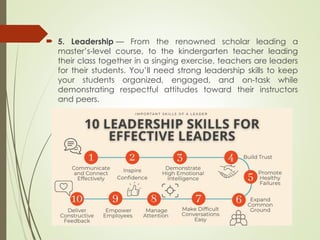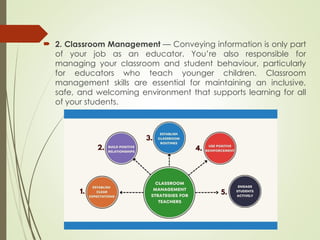Effective Teaching by SHAIKH MOHSIN FAROOQ
- 1. How to Be an Effective Teacher By Shaikh Mohsin
- 2. Characteristics of an Effective Teacher Is a good classroom manager Designs lessons to reach mastery Has positive expectations that students will be successful “Each student comes to school with an unlit candle with the expectation for you to light it.” _Harry Wong
- 3. Characteristics of a Well- Managed Classroom Students are deeply involved in their work. Students know what is expected of them and are generally successful. There is relatively little wasted time, confusion, or disruption. The climate of the classroom is work-oriented but relaxed and pleasant.
- 4. Reasons Why Students Don’t Follow Procedures Teacher has not thought out what happens in the classroom. Students have not been trained to follow the procedures. Teacher spends no time managing the classroom.
- 5. CHARACTERISTICS OF EFFECTIVE CHARACTERISTICS OF EFFECTIVE TEACHER TEACHER Active listening Adaptability Collaboration Creativity Empathy
- 6. CHARACTERISTICS OF EFFECTIVE CHARACTERISTICS OF EFFECTIVE TEACHER TEACHER Engagement Focus on growth Lifelong learning Patience Preparedness Respect
- 7. 1. Adaptability Adaptability is a must for teachers, who need to continuously evaluate what’s working for their students — and even more importantly, what isn’t working. Being adaptable and flexible allows you to flow between different theories of learning and modes of teaching — something we’ll discuss momentarily — without becoming immobilized by stress or indecision.
- 8. 2. Empathy Empathy is the ability to understand what another person is feeling or experiencing — put simply, putting yourself in another person’s shoes. As a teacher, it’s vital to practice empathy instead of making assumptions — for instance, making efforts to understand and address the root issue that’s causing a student to fall behind their peers, perform more poorly than they used to, or lash out in class.
- 9. 3. Patience Patience is important both to possess and to model for your students — who, as we discussed in our post on theories of learning, may view you as a role model and emulate your behavior. Having a reserve of patience will make it easier for you to work through each student’s unique struggles and challenges, which may be difficult or slow-going to overcome.
- 10. 4. Engagement Students are perceptive from an extremely young age and can easily tell when teachers are bored by or apathetic toward their own material. If you want to generate engagement and enthusiasm in your class, it’s imperative to exemplify those traits yourself, showing your students an infectious passion for learning — and all the exciting discoveries and hobbies that it can unlock for them!
- 11. 5. Active Listening Active listening is vital if you want to effectively diagnose and help overcome students’ unique obstacles and challenges. Seek feedback, encourage honesty, provide ways for students to contact you easily, and be attentive whenever you listen, always trying to read between the lines and assess body language while you’re communicating.
- 12. 6. Lifelong Learning The best educators aren’t just interested in teaching — they also have a passion for lifelong learning, which is reflected in their enthusiasm and engagement as instructors. Continued learning and professional development deliver invaluable insight, keeping professionals “sharp” and reminding teachers of the real-world challenges that their students may be facing — creating a pathway for greater empathy.
- 13. 7. Free of Bias As an educator, you’ll be responsible for teaching an extraordinarily wide range of students. To combat inequality and discrimination and ensure fairness, you need to assess your students’ needs in a way that is free from bias — something that requires you to continuously check in with your own judgments and assumptions about others.
- 14. 8. Respectful Attitude Even in classrooms of adult learners, there’s still an inherent imbalance of power that exists between students and teachers. It’s imperative for educators to be mindful of this imbalance and ensure that students feel respected and heard for the people they are and what they contribute to the classroom.
- 15. 9. Creativity Creativity goes hand in hand with adaptability — another key trait we explored on this list. Whether you teach first graders or doctoral students, you’ll need the ability to innovate, think outside the box, and find novel solutions to challenges, which will empower you to meet a wider range of students’ needs. Being creative as an educator will also help you to foster creativity in your students — an essential skill they’ll need for countless career paths.
- 16. 10. Collaborative From parent-teacher conferences and department meetings to teaching dozens or hundreds of students every day, education is an intensely collaborative field by nature, involving a constant interplay between students, teachers, administrators, and family members. If your goal is to become an educator or transition into an educational leadership position, you’ll need strong collaborative skills to ensure you can work well with others consistently.
- 17. 11. Preparation In line with being flexible and adaptable, it’s important to be prepared for a wide range of scenarios and challenges in the classroom. You can increase your overall level of preparedness as an educator by learning about your students’ strengths and challenges, and ensuring that you consider how each of your students could be affected by your lesson plans.
- 18. 12. Promote a Growth Mindset In 2006, psychologist Carol Dweck introduced the concept of “growth mindsets” vs. “fixed mindsets” in her book Mindset: The Psychology of Success. According to Dweck, individuals with a fixed mindset perceive assets like intelligence as being determined early in life, which can cause obstacles or challenges to seem insurmountable or overwhelming. In contrast to a fixed mindset, individuals who have a growth mindset believe that traits like intelligence and creativity can be developed with practice.
- 19. 13. Meet Students Where They Are Your students will come to you from different backgrounds, skill sets, and challenges — and you need to be ready to meet them, whichever point they’ve reached in their learning. That means having the ability to accommodate students who learn at different paces, using different styles and methods, within the same classroom or group. This is another area where traits like adaptability, empathy, and patience come into play for educators.
- 20. 14. Cross-Discipline Teaching Drawing on multiple subjects and disciplines shows students how businesses operate — and how problem-solving works — in the real world, grounding their learning in practical real-life scenarios. If you don’t possess all of these traits already, don’t panic — just be mindful that there may be some areas where you could benefit from a little practice. Whether your goal is to tune up weak skills, refine strong ones, or develop new abilities, a degree or credential program provides the perfect opportunity to acquire the qualifications and experience you need to go further in your chosen career path.
- 21. 8 IMPORTANT SOFT SKILLS FOR TEACHERS 8 IMPORTANT SOFT SKILLS FOR TEACHERS 1. Communication — Verbal, nonverbal, and written communication are fundamental for any educator. Not only does clear communication enable you to learn about your students, how they learn, and what challenges or motivates them most — it also empowers you to dialogue with parents and families, share information with your colleagues and administrators more productively, and create a more inclusive environment for students from diverse backgrounds.
- 22. 2. Time Management —You expect your students to complete their assignments on time — so it’s vital that you model the same skills. Effective time management, will help you ensure that tasks like grading papers, composing quizzes, and meeting with students are completed in a timely fashion that aligns with your curriculum and lesson plan calendar.
- 23. 3. Strong Work Ethic — Teachers can be expected to carry heavy workloads. It’s essential to possess a strong work ethic to help you manage the demands of the role.
- 24. 4. Problem Solving — From unexpected technical issues to bullying and conflicts between students, teachers are frequently confronted with unplanned situations that need to be resolved so that learning can continue. You’ll need robust problem-solving skills to ensure that you’re prepared to address a wide range of impediments to learning
- 25. 5. Leadership — From the renowned scholar leading a master’s-level course, to the kindergarten teacher leading their class together in a singing exercise, teachers are leaders for their students. You’ll need strong leadership skills to keep your students organized, engaged, and on-task while demonstrating respectful attitudes toward their instructors and peers.
- 26. 6. Variety of Teaching Methods — Teachers need the ability to employ a variety of teaching methods to meet students’ equally varied needs, ranging from teacher-directed (like lectures and worked examples) to student-directed (like collaborative and project-based learning). For example, it’s important to be familiar with traditional methods of learning vs. inquiry-based learning. You can learn more about teaching methods and how to implement them in our guide to theories of learning.
- 27. 7. Variety of Teaching Modes — Educators should be familiar with — and develop teaching strategies that are adapted to — the various VARK “modalities of learning,” an acronym that refers to “Visual, Aural, Read/write, and Kinaesthetic” modes of learning.
- 28. Different Teaching styles
- 29. 8. Emotional Intelligence — Emotional intelligence is a broad term that describes a person’s ability to understand, analyse, and manage their own emotional responses. Emotional intelligence is critical for teachers, who need to maintain professionalism and demonstrate leadership even when placed under high-pressure, high-stress situations.
- 30. 7 IMPORTANT HARD SKILLS FOR TEACHERS 7 IMPORTANT HARD SKILLS FOR TEACHERS 1. Computer and Technology Skills — Computers and other technology play increasing roles in education, Technological proficiency is vital for teachers in any subject, especially if you plan on teaching online or media-rich courses.
- 31. 2. Classroom Management — Conveying information is only part of your job as an educator. You’re also responsible for managing your classroom and student behaviour, particularly for educators who teach younger children. Classroom management skills are essential for maintaining an inclusive, safe, and welcoming environment that supports learning for all of your students.
- 32. 3. Administrative Skills — Administrative skills include skills such as strategic thinking, strong organization and time management, and the ability to lead effectively while communicating clearly. These types of skills are useful for both school administrators and educators, with several (like time management) receiving their own places on this list!
- 33. 4. Writing and Grammar Skills — It isn’t just English or creative writing teachers who need a firm grasp of grammar and spelling. You’ll need strong writing skills for routine tasks like emailing parents and administrators, correcting students’ assignments, sharing demonstrations on the board, and possibly even requesting grants or other funding.
- 34. 5. Certificates and Credentials — In addition to earning your degree, you’ll also need to earn certain certificates and credentials depending on factors like where and what you’d like to teach.
- 35. 6. Qualifications and Degrees — Most teaching positions require a minimum of a bachelor’s degree, with certain types of teaching positions or academic employers requiring a master’s or even doctoral degree. National University offers a range of accredited online and on-campus degree programs in education to help prepare you for a career in teaching or school administration, like preparing you for professional exam requirements. Learn more about the process of becoming a teacher, or explore the state’s requirements for becoming a teacher in California.
- 36. 7. Curricular Knowledge — It’s essential to have extensive and in-depth knowledge of your curriculum so that you can lead meaningful discussions and help your students connect larger ideas together. For example, you’ll need to be fluent in any foreign language that you intend to teach.
- 37. Thank You





































